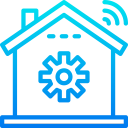Home automation is the use of smart devices and systems to control and monitor various aspects of home operations, such as lighting, security, temperature, entertainment and more. Home automation offers benefits such as convenience, safety, energy efficiency and lower utility costs.
According to various sources 1 2 3 4 5, the home automation market is expected to grow significantly in the next few years, driven by factors such as:

- The increasing adoption of internet of things (IoT) technology, which enables devices to communicate and interact with each other over the internet.
- The growing demand for smart home devices among millennials and other consumers who value comfort, convenience and customization.
- The rising awareness of environmental issues and the need to reduce energy consumption and carbon footprint.
- The advancement of artificial intelligence (AI) and voice assistants, which enhance the functionality and user experience of smart home systems.
- The innovation and development of new products and services by key market players, such as Google, Amazon, Apple, Samsung, Philips, Honeywell and more.
Some of the current and future trends in home automation include:
- Integration: Smart home devices are becoming more compatible and interconnected with each other, allowing users to control and manage their entire home operations from a single platform or app.
- Touchless tech: Smart home devices are incorporating touchless features such as voice control, gesture recognition and facial recognition, which improve convenience and hygiene.
- Personalization: Smart home devices are becoming more intelligent and adaptive to user preferences, habits and routines, offering customized solutions and recommendations.
- Security: Smart home devices are enhancing security and safety by providing real-time alerts, remote monitoring and access control.
- Wellness: Smart home devices are promoting wellness and health by improving air quality, lighting, temperature and humidity levels.
